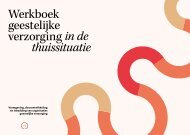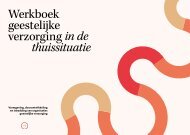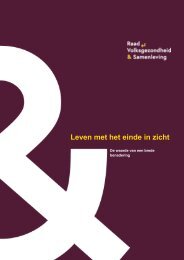Buiten kerk en moskee
Religie in een pluriforme samenleving. Diversiteit en verandering in beeld.
Religie in een pluriforme samenleving. Diversiteit en verandering in beeld.
Create successful ePaper yourself
Turn your PDF publications into a flip-book with our unique Google optimized e-Paper software.
One striking finding is that respond<strong>en</strong>ts who are not affiliates of a traditional religion regularly<br />
stated during the interviews that they do not see the abs<strong>en</strong>ce of a faith and a framework<br />
of meaningfulness outside and above the individual as problematic: ‘My life has no<br />
point at all, but I still <strong>en</strong>joy it’. Yet for many agnostics, atheists and modern-day spirituals,<br />
life is more than a collection of individual impressions and experi<strong>en</strong>ces, and they not<br />
uncommonly feel a form of progression which has and gives meaning. For the religious<br />
nones, as for the spirituals, this appears to be an important elem<strong>en</strong>t of meaningfulness,<br />
though they appear to interpret this more as something collectivist (‘as a society we are<br />
becoming ever more intellig<strong>en</strong>t and ever better’), whereas progress for modern-day spirituals<br />
is in the first instance above all a question of self-improvem<strong>en</strong>t and personal growth.<br />
Placing the findings of this trilogy in a broader context<br />
In the conclusion to chapter 7 we briefly drew out the main findings from this ideological<br />
trilogy. The overarching finding is of course the rapid demise of the Christian faith during<br />
the past decade. The perc<strong>en</strong>tage of Dutch citiz<strong>en</strong>s who have never be<strong>en</strong> brought up in a<br />
particular religion rose from 25% to 36% betwe<strong>en</strong> 1975 and 2018, while the perc<strong>en</strong>tage<br />
who are not affiliated to a church community rose from 42% to 76%. The perc<strong>en</strong>tage who<br />
never att<strong>en</strong>d a church service rose from 53% in 1983 to 69% in 2018, while the perc<strong>en</strong>tage<br />
of avowed atheists increased from 16% in 1991 to 29% in 2018. The perc<strong>en</strong>tage who believe<br />
in a God who is concerned about each and every one of us personally has shrunk by twothirds<br />
since the mid-1960s. Initially, in the 1960s and 70s, the perc<strong>en</strong>tage of ‘ietsists’<br />
(‘somethingists’) rose rapidly, followed in the 1980s and 90s by the perc<strong>en</strong>tage of agnostics,<br />
while since the turn of the mill<strong>en</strong>nium it is the perc<strong>en</strong>tage of atheists that has be<strong>en</strong><br />
rising strongly.<br />
The surrounding culture is developing in an areligious direction. Church ceremonies are<br />
becoming less and less a (promin<strong>en</strong>t) part of national public life, and trust in the Church is<br />
also crumbling. It must be borne in mind here that the chance is vanishingly small that<br />
someone who picks up almost nothing about the Christian tradition from their upbringing,<br />
little from other socialisation settings and only indirect and small impulses from the surrounding<br />
culture, will ever develop into a committed church member, for example. Compared<br />
with church milieus, the success of non-church milieus in terms of socialisation is<br />
<strong>en</strong>ormous. ‘God in the Netherlands’, a series of surveys that have be<strong>en</strong> held since 1966,<br />
traces the collapse in the belief in the Christian doctrine. If we limit ourselves to the four<br />
fundam<strong>en</strong>tal pillars of the Christian faith, each of them – the belief in a God who is personally<br />
concerned about each and every human being, the status of Christ as his son or s<strong>en</strong>t<br />
into the world by him, the view that the Bible is the word of God and the belief in life after<br />
death – are now supported by only a minority of the population (ranging from 14% to<br />
28%).<br />
In the light of all this, it is difficult to argue with the premise that the Christian religion,<br />
both in terms of belief and in the form of collective participation and church-based organisation,<br />
is gradually disappearing in the Netherlands. The main bastions of traditional reli-<br />
170 s u m m a r y










